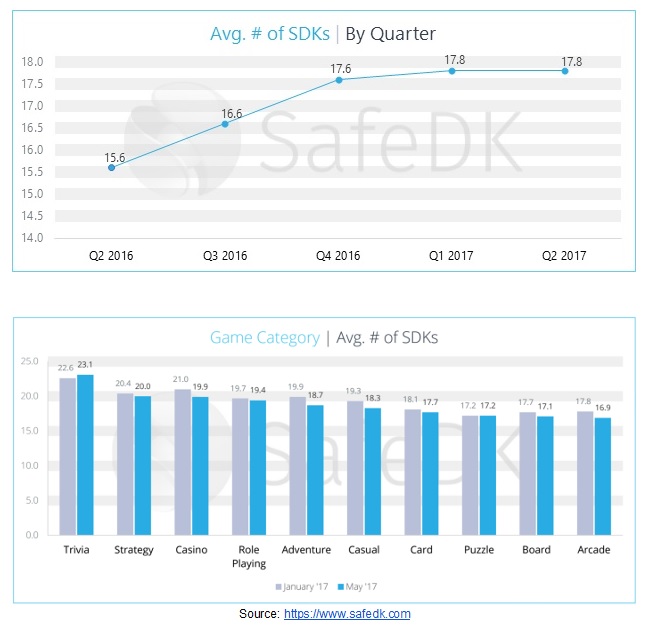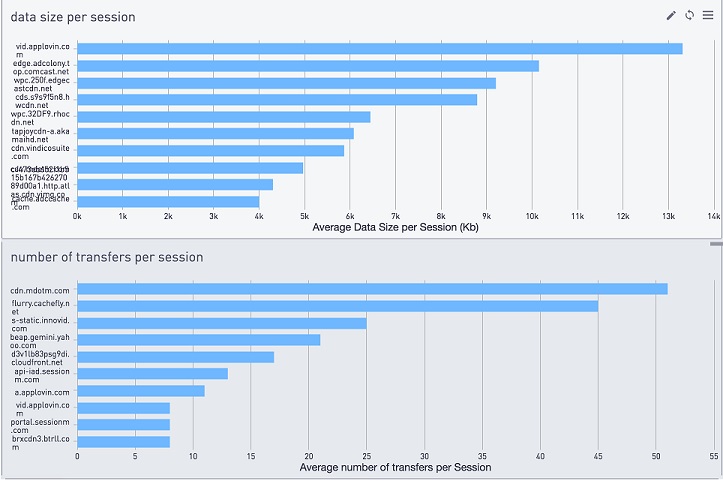CodeSecure and FOSSA announced a strategic partnership and native product integration that enables organizations to eliminate security blindspots associated with both third party and open source code.
Mobile SDKs (software developments kits); love them or hate them, they're here to stay. They provide our apps with all sorts of functionality that would be incredibly time consuming to build, and they give us another means to monetize our apps. Third party SDKs are in fact, quite popular.
According to a study done by SafeDK, on average each Android app uses nearly 18 third party SDKs. That number is even higher for mobile games. While it would be difficult to argue that SDKs aren’t useful, it’s also hard for developers to get a good idea of the amount of resources used by each SDK once the app is in production.

What makes a good SDK? Some of the common factors to consider while judging the quality of an SDK are functionality, ease of use, and documentation. Some other attributes to consider are CPU usage, effect on battery, playing nice with other SDKs, and even network data usage.
As mentioned, each Android app uses 18 third party SDKs on average. It therefore is very important for all SDKs to function in harmony. The effect on CPU, battery and data consumed per session are all also important for apps because each of these could lead to users uninstalling the app. Let’s discuss data consumed per session. This is an important factor when you consider users who have limited data plans.
So how does one know which SDK is consuming the most data per session? What are the number of transfers per session? There are a number of ways you can look at the traffic requests made by various SDKs. You could route the app traffic through a proxy, run the app on your test device and see what’s happening, but unfortunately this will only show you the results of your own individual tests, giving you an idea of performance, but likely a statistically insignificant answer. Another way is to use a Mobile Application Monitoring tool. This gives you a whole suite of tools and the results would be from real productions users. The downside here is that it can get very pricey.
We often hear from mobile app developers about the need for an analytics product that would provide all the statistics for third party data transfers and would be able to capture the specific domains and URLs that are causing the largest amount of data consumption.
The chart below is from a gaming app with traffic mostly in the US and Canada with ~10K DAU (Daily Active Users). Like many mobile games, this app also relies on ads for a large portion of its revenue. Hence the preponderance of ad SDKs in its list of data consumers.
In the chart, both "vid.applovin" and "edge.adcolony" are ad SDKs, but each one has different data size per session (~13Kb and ~10Kb respectively). This simply could be because vid.applovin is serving more ads compared edge.adcolony because that is how the developer prioritized their ads, or it could have something to do with the frequency that the ad content is refreshed or the size of the individual ads. What you do get is greater insight into what the SDKs in your app are actually doing.
You should think about this as you consider which SDKs to include in your app. Mobile data is expensive (and frequently slow) for users, especially in developing countries. As app developers, it makes sense to to keep an eye on data usage metrics to accommodate a global user base.

In conclusion, there’s a real need for app developers to collect detailed network performance statistics about their apps. To be efficient, that solution would need to be:
1. Designed from the ground up for mobile applications with Real User Monitoring (RUM)
2. Lightweight in its metrics collection (i.e SDK uses just one UDP packet).
A smart SDK should be FREE and also allow developers to compare their app performance with industry references (benchmarks) and automatically optimize their code at run-time based on thousands of different network types, locations and times faced by their apps.
Industry News
Bauplan, a Python-first serverless data platform that transforms complex infrastructure processes into a few lines of code over data lakes, announced its launch with $7.5 million in seed funding.
Perforce Software announced the launch of the Kafka Service Bundle, a new offering that provides enterprises with managed open source Apache Kafka at a fraction of the cost of traditional managed providers.
LambdaTest announced the launch of the HyperExecute MCP Server, an enhancement to its AI-native test orchestration platform, HyperExecute.
Cloudflare announced Workers VPC and Workers VPC Private Link, new solutions that enable developers to build secure, global cross-cloud applications on Cloudflare Workers.
Nutrient announced a significant expansion of its cloud-based services, as well as a series of updates to its SDK products, aimed at enhancing the developer experience by allowing developers to build, scale, and innovate with less friction.
Check Point® Software Technologies Ltd.(link is external) announced that its Infinity Platform has been named the top-ranked AI-powered cyber security platform in the 2025 Miercom Assessment.
Orca Security announced the Orca Bitbucket App, a cloud-native seamless integration for scanning Bitbucket Repositories.
The Live API for Gemini models is now in Preview, enabling developers to start building and testing more robust, scalable applications with significantly higher rate limits.
Backslash Security(link is external) announced significant adoption of the Backslash App Graph, the industry’s first dynamic digital twin for application code.
SmartBear launched API Hub for Test, a new capability within the company’s API Hub, powered by Swagger.
Akamai Technologies introduced App & API Protector Hybrid.
Veracode has been granted a United States patent for its generative artificial intelligence security tool, Veracode Fix.
Zesty announced that its automated Kubernetes optimization platform, Kompass, now includes full pod scaling capabilities, with the addition of Vertical Pod Autoscaler (VPA) alongside the existing Horizontal Pod Autoscaler (HPA).
Check Point® Software Technologies Ltd.(link is external) has emerged as a leading player in Attack Surface Management (ASM) with its acquisition of Cyberint, as highlighted in the recent GigaOm Radar report.




